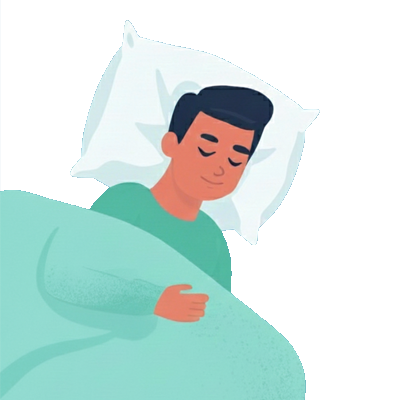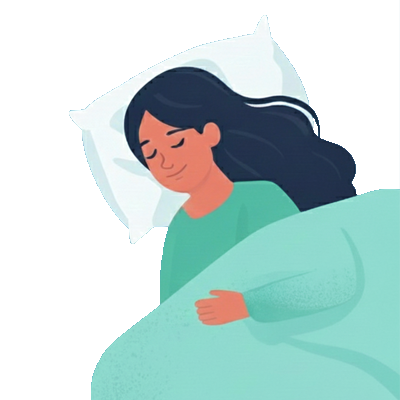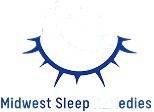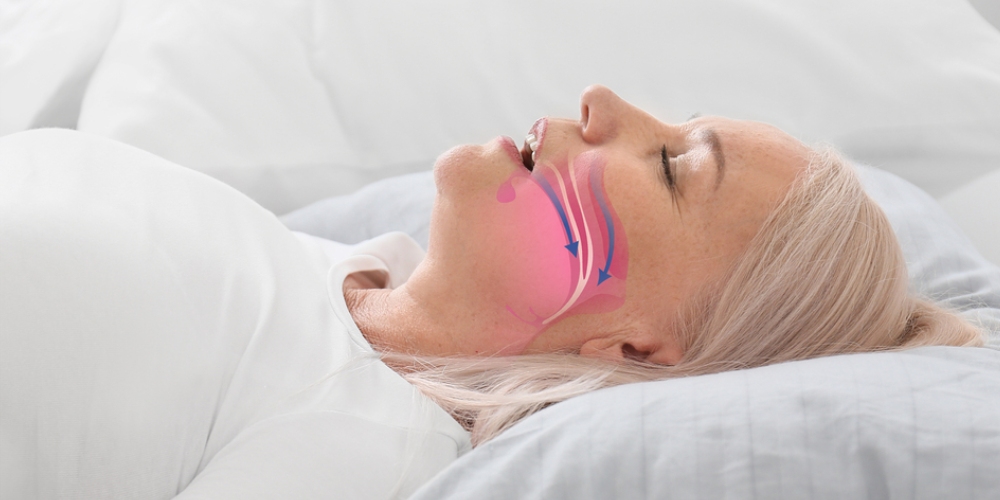What if your body was being starved of oxygen every night, and you didn’t even know it? That’s exactly what happens with untreated sleep apnea. While you sleep, your breathing repeatedly stops and starts, triggering a chain reaction that affects everything from your heart to your hormones.
Sleep apnea isn’t just a nighttime nuisance; it’s a serious medical condition that silently damages your health over time, often without any obvious warning signs.
In this blog, we’ll explore what sleep apnea really is, the dangers of untreated sleep apnea, and why early diagnosis and treatment can be lifesaving.
Key Takeaways:
- Sleep apnea causes repeated breathing pauses during sleep, starving the body of oxygen.
- Sleep apnea comes in three main forms: obstructive sleep apnea (OSA), central sleep apnea (CSA), and complex sleep apnea.
- Untreated sleep apnea increases the risk of heart disease, diabetes, depression, and weight gain.
- Many people with sleep apnea don’t know they have it because symptoms often go unnoticed.
- It can lead to dangerous daytime fatigue, increasing the risk of car and workplace accidents.
- Proper diagnosis and treatment, including CPAP and lifestyle changes, can dramatically improve health and quality of life.
What is Sleep Apnea?
Sleep apnea is a common but potentially dangerous sleep disorder in which your breathing repeatedly stops and starts while you sleep. These interruptions in breathing can last from a few seconds to over a minute and may occur hundreds of times in a night, without a person being aware.
Each time your breathing stops, the oxygen level in your blood drops, causing a state of breathlessness. In response, your brain briefly wakes you up just enough to restore breathing, usually with a gasp, choke, or snort. While you may not remember these moments, they severely disrupt your sleep cycle.
As a result, people with sleep apnea often suffer from:
- Chronic fatigue
- Daytime sleepiness
- Poor concentration and memory
- Mood swings or irritability
- And over time, serious health complications affecting the heart, brain, and metabolism
These repeated drops in oxygen levels and frequent sleep disruptions place continuous stress on the body, which often leads people to ask a very serious question:
Can Sleep Apnea Kill You in Your Sleep?
The truth is, while a single sleep apnea event rarely causes immediate death, untreated sleep apnea significantly increases the risk of dying during sleep, especially from cardiovascular causes. This is particularly true for individuals with severe sleep apnea, existing heart disease, or those over the age of 60. Studies have shown that people with moderate to severe sleep apnea are more than three times as likely to die from all causes, with sudden cardiac death and stroke being the leading threats.
So, while sleep apnea may not directly stop your heart in one night, its long-term effects can quietly and seriously increase the risk of dying in your sleep if not properly treated.
Therefore, early diagnosis and proper treatment are essential to prevent the long-term consequences of untreated sleep apnea and protect your overall health.
Types of Sleep Apnea
Sleep apnea isn’t a single condition; it comes in three different types, each with different causes and effects on the body. Understanding these types of sleep apnea can help guide proper diagnosis and care.
1. Obstructive Sleep Apnea (OSA)
Obstructive sleep apnea (OSA) is more commonly diagnosed than other types. It usually occurs in deep sleep, when the muscles are naturally more relaxed, causing the airway to narrow or collapse. This blockage leads to pauses in breathing, often accompanied by loud snoring, gasping, or choking sounds.
2. Central Sleep Apnea (CSA)
Central sleep apnea (CSA) is less common than obstructive sleep apnea (OSA) and is caused by a malfunction in the brain’s control over breathing. In this type, the brain fails to send proper signals to the muscles that control breathing, resulting in frequent pauses in airflow.
Additionally, the airway is not physically blocked, making it different from the OSA. Instead, the issue lies in communication between the brain and the respiratory system.
Moreover, people with CSA usually do not snore and may experience frequent nighttime awakenings, shortness of breath, and difficulty staying asleep.
3. Complex Sleep Apnea
Complex sleep apnea, also known as treatment-emergent central sleep apnea, is a form of sleep apnea that combines features of both obstructive sleep apnea (OSA) and central sleep apnea (CSA).
Additionally, this type of sleep apnea typically develops when a person who has already been diagnosed with OSA begins treatment, usually with CPAP (Continuous Positive Airway Pressure). While the CPAP machine successfully opens the blocked airway, a new breathing issue can emerge; the brain fails to send proper signals to the breathing muscles, leading to central apneas. This results in a mixed pattern of both obstructive and central events, known as complex sleep apnea.
Looking for a Comfortable Way to Manage Sleep Apnea?
Discover custom oral appliances designed to treat sleep apnea comfortably and effectively.




Common Symptoms of Sleep Apnea
Sleep apnea can often go unnoticed because it occurs while you’re sleeping. However, it leaves behind multiple symptoms that may signal an underlying issue. Recognizing these signs is crucial for timely diagnosis and better treatment.
Nighttime Symptoms
These symptoms often occur while you’re asleep and may be observed by a partner or family member:
- Loud, frequent snoring (especially in OSA)
- Pauses in breathing during sleep
- Gasping or choking sounds while sleeping
- Restless sleep or frequent awakenings
- Dry mouth or sore throat upon waking
- Night sweats
Daytime Symptoms
Even if you don’t notice any sleep disturbances, your body may show signs during the day:
- Excessive daytime sleepiness
- Morning headaches
- Difficulty concentrating or memory issues
- Irritability, mood swings, or depression
- Low energy or fatigue throughout the day
- Falling asleep during quiet activities like reading or watching TV
Not everyone with sleep apnea snores, especially in central sleep apnea (CSA). And many people who snore don’t have sleep apnea. That’s why it’s important to recognize the full range of symptoms, not just snoring alone.
Why Untreated Sleep Apnea is a Silent Threat
One of the most dangerous things about sleep apnea is that it is too easy to go unnoticed. In fact, many people with this condition don’t even know that their breathing is being interrupted hundreds of times a night.
Over time, this lack of awareness turns sleep apnea into a silent threat. Without proper treatment, the condition can gradually affect the heart, brain, and metabolism, often before any signs appear. Moreover, the side effects of untreated sleep apnea may not be immediate, but they build over time and can lead to serious health consequences.
How Sleep Apnea Affects the Body: System-by-System Breakdown
Sleep apnea doesn’t just make you feel tired. It impacts multiple body systems even if you do not notice it right away. All in all, let’s take a look at how sleep apnea can affect the body system and overall health.
Cardiovascular System: Higher Risk of Heart Attack and Stroke
When your breathing stops during sleep, your oxygen levels drop. As a result, your heart works harder to keep the blood flowing. This ongoing strain raises your risk of high blood pressure, irregular heartbeats, stroke, and even heart attacks.
Moreover, people with untreated sleep apnea are more likely to experience heart failure. These are not just long-term risks; they can happen all of a sudden without even warning.
Endocrine System: Sleep Apnea and Type 2 Diabetes
Sleep apnea interferes with insulin production. In many cases, this leads to insulin resistance, where your body no longer responds properly to insulin. Over time, it can contribute to type 2 diabetes, even in people who are not overweight.
Additionally, poor sleep messes with your hormones. This affects how your body handles sugar and hunger, making it harder to stay healthy.
The Psychological Toll: Anxiety, Depression, and Mental Health
Interrupted sleep doesn’t just make you tired, it changes how your brain functions. People with sleep apnea often report feeling depressed, anxious, or irritable. In some cases, it may even worsen depression or trigger anxiety attacks.
Furthermore, many experience memory problems and struggle to stay focused. If you often feel mentally foggy, or notice symptoms of depression and anxiety, sleep apnea might be the reason.
Danger in the Daylight: Fatigue, Focus, and Accidents
When your body doesn’t get deep, restful sleep, you often feel sleepy during the day and remain unfocused, unable to concentrate. Furthermore, you might struggle to stay alert, feel drowsy while driving, or even doze off at your desk.
In fact, untreated sleep apnea is a major cause of car accidents and workplace injuries. It’s not just about feeling sleepy, it’s about being unsafe.
Chronic Pain and Sleep Apnea: An Overlooked Relationship
Many people don’t realize that poor sleep worsens chronic pain. If your body isn’t getting the rest it needs to recover, pain can become harder to manage.
Additionally, untreated sleep apnea is linked to fibromyalgia, joint pain, and muscle aches. If your pain isn’t improving, poor sleep could be part of the problem.
Digestive Health: The Acid Reflux Connection
Sleep apnea can also affect your stomach. Many people with this condition also suffer from acid reflux or GERD, especially at night.
As a result, breathing disruptions and stomach acid together can make your sleep even worse, creating a painful cycle.
Sleep Apnea and Obesity: A Vicious Cycle
The relationship between sleep apnea and obesity is bidirectional. Each condition can make the other worse over time. Sleep apnea affects your hunger hormones, increases cravings for unhealthy foods, and leaves you too tired to exercise.
Therefore, many people find themselves trapped in a cycle, the more weight they gain, the worse their sleep apnea becomes.
What Happens if You Don’t Treat Sleep Apnea
Untreated sleep apnea never stays the same. Infact, it gets worse. You might think you’re just tired or stressed, but beneath the surface, your body is struggling.
Over time, the side effects of untreated sleep apnea can lead to:
- Heart disease
- Type 2 diabetes
- Depression
- Weight gain
- Memory loss
- High blood pressure
- Reduced quality of life
Therefore, treating sleep apnea isn’t just about stopping snoring, it’s about saving your health.
How to Get Diagnosed and Treated
If you suspect sleep apnea, don’t ignore it. Here’s what you can do:
- Talk to your doctor: Share your symptoms honestly.
- Get a sleep study: This test monitors your breathing overnight.
- Consider CPAP therapy: This machine keeps your airway open during sleep.
- Explore other options: Some people benefit from dental devices, lifestyle changes, or surgery.
Moreover, small lifestyle changes like losing weight, avoiding alcohol before bed, and sleeping on your side can also help manage mild cases.
And if you are worried about how to get diagnosed or where to start? You are not alone!
At Midwest Sleep REMedies, we specialize in providing comprehensive sleep solutions, from initial consultation to long-term treatment plans. If you suspect sleep apnea, taking action today could protect your heart, brain, and overall health.
Conclusion
Sleep apnea is more than just loud snoring or feeling tired during the day; it’s a serious medical condition that puts your entire body at risk. If left untreated, it can quietly damage your heart, brain, metabolism, and emotional well-being. The side effects of untreated sleep apnea are far-reaching, affecting your safety, relationships, and long-term health.
But sleep apnea is treatable. With the right diagnosis and care, you can break the cycle of poor sleep, protect your health, and finally wake up feeling refreshed again.
Have Questions About Disturbed Sleep?
Don’t wait for the symptoms to get worse. Talk to your doctor, get tested, and take the steps toward better sleep and a healthier life.










